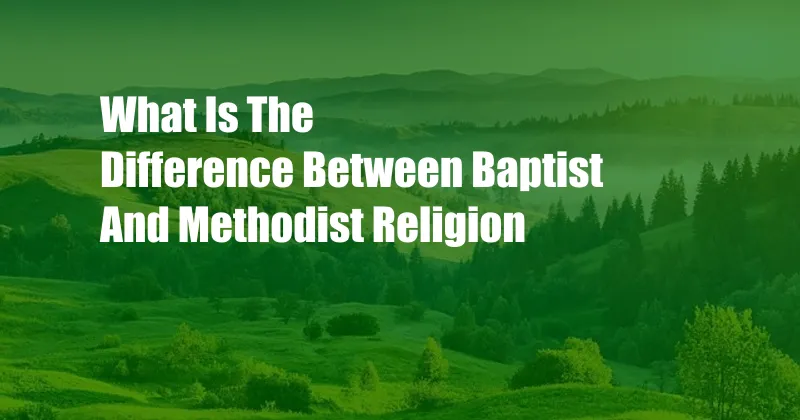
Baptist vs. Methodist: Unveiling the Differences in Religious Beliefs and Practices
Growing up in a small town, I’d often witness the friendly rivalry between Baptists and Methodists, two of the most prominent Christian denominations. While their churches stood side by side, their beliefs and practices seemed vastly different. This curiosity sparked my exploration into the intricate tapestry of these two influential faiths.
As I ventured into the world of Baptist and Methodist theology, I realized that their distinctions extend beyond mere stylistic differences. These denominations embody unique perspectives on baptism, church governance, and the role of tradition, shaping the spiritual journeys of millions worldwide.
The Sacrament of Baptism: Central to Faith, Yet Distinct in Practice
Baptism holds immense significance in both Baptist and Methodist traditions, yet their practices differ notably. Baptists adhere to believer’s baptism, where individuals consciously profess their faith and are immersed in water. This act symbolizes their acceptance of Christ’s salvation and their commitment to live a life of discipleship.
In contrast, Methodists practice infant baptism, wherein babies are baptized shortly after birth. This practice stems from the belief that baptism is a covenant between God and the believer, regardless of their age or understanding. Methodists view baptism as a sign of God’s grace and the inclusion of the child into the community of faith.
Church Governance: From Congregational Autonomy to Hierarchical Structure
The structure of Baptist and Methodist churches also exhibits marked differences. Baptists embrace congregational governance, where each local church operates autonomously. Individual congregations are solely responsible for their own decisions, including the selection of their pastors and the management of their finances.
Methodists, on the other hand, follow an episcopal system, characterized by a hierarchical leadership structure. Bishops, ordained ministers who oversee multiple congregations, play a central role in the governance of the church. This system allows for a greater degree of centralized oversight and coordination within the Methodist denomination.
Tradition and Interpretation: Scripture and the Role of Reason
Baptists and Methodists approach biblical interpretation and the role of tradition in varying ways. Baptists place a strong emphasis on sola scriptura, the belief that the Bible alone is the ultimate authority for faith and practice. They prioritize the literal interpretation of Scripture and place less emphasis on church tradition.
Methodists, while acknowledging the importance of Scripture, also recognize the value of tradition. They believe that the teachings of the early church fathers and the wisdom of past generations can provide guidance in understanding and applying biblical principles to contemporary life.
Current Trends and Developments: Contemporary Christianity in a Changing World
Both Baptist and Methodist denominations are actively navigating the challenges and opportunities presented by the 21st century. Social justice, inclusivity, and the use of technology are among the key issues shaping their current trajectories.
Baptists are known for their involvement in social activism, particularly in areas related to racial justice, poverty, and environmental stewardship. Methodists, too, emphasize the importance of social responsibility and seek to engage with the wider community through various outreach programs and initiatives.
Practical Tips and Expert Advice for Navigating Religious Choices
If you’re exploring different Christian denominations, here are some tips to consider:
- Visit different churches: Attend services and interact with the congregation to get a feel for the worship style, community atmosphere, and theological perspectives.
- Read and study: Delve into the doctrinal statements and beliefs of each denomination to gain a deeper understanding of their core principles.
- Seek guidance: Consult with pastors, theologians, or spiritual advisors who can provide insights and help you discern which denomination aligns best with your faith journey.
FAQs: Answering Common Questions about Baptist and Methodist Faith
Q: Can Methodists attend Baptist churches, and vice versa?
A: While Baptist and Methodist churches maintain their respective practices and beliefs, there is no restriction on attending services or participating in activities across denominations.
Q: Do Baptists believe in eternal security?
A: Baptists generally believe in the doctrine of eternal security, which holds that true believers cannot lose their salvation.
Q: Are Methodist churches more conservative than Baptist churches?
A: It varies. There is a wide range of theological and social perspectives within both Baptist and Methodist denominations.
Conclusion: A Rich Tapestry of Faith and Diversity
The differences between Baptist and Methodist churches are not merely superficial variations. They reflect deeply held beliefs and practices that shape the spiritual lives of countless individuals. By understanding these distinctions, we gain a deeper appreciation for the rich tapestry of Christianity and the diversity of ways to express one’s faith.
If you’re curious about learning more about Baptist or Methodist Christianity, I encourage you to embark on your own journey of exploration. Visit different churches, read their doctrinal statements, and engage with members of the congregation. May this article serve as a stepping stone towards your understanding of these vibrant and impactful denominations.